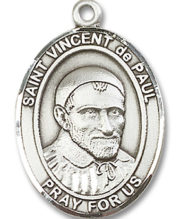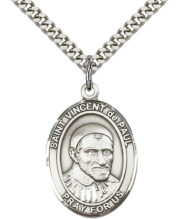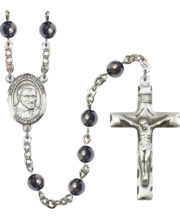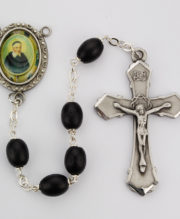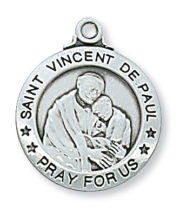Saints
St. Vincent de Paul Biography
ST. VINCENT DE PAUL, 1576-1660
Feast Day St. Vincent de Paul: July 19 “St. Vincent de Paul was a French Catholic priest, theologian, and philanthropist who lived in the 17th century. He is best known for his strong commitment to helping the poor and his founding of several charitable organizations, including the Vincentians and the Daughters of Charity.
“St. Vincent de Paul was a French Catholic priest, theologian, and philanthropist who lived in the 17th century. He is best known for his strong commitment to helping the poor and his founding of several charitable organizations, including the Vincentians and the Daughters of Charity.
St. Vincent de Paul was born in 1581 in a small village in the Gascony region of France. He was the fourth of five children in a peasant family, and his parents were very religious. He received a basic education as a child and later attended seminary to become a priest.
In 1600, St. Vincent de Paul was ordained a priest, and he began his ministry in the French countryside. However, his life took a dramatic turn in 1605 when he was captured by Barbary pirates while on a voyage to Tunis. He was sold into slavery and spent two years in captivity before finally being ransomed and returning to France.
After his return to France, St. Vincent de Paul began to dedicate his life to helping the poor. He made it his mission to care for the sick, the poor, and the imprisoned, and he began traveling throughout the country to visit hospitals and prisons. He also started to organize groups of laypeople to help him in his work, which eventually led to the founding of the Vincentians, a religious congregation of priests and lay brothers.
In addition to the Vincentians, St. Vincent de Paul also founded the Daughters of Charity, an order of nuns who were dedicated to serving the poor and the sick. The Daughters of Charity quickly became a model for other religious orders, and they spread rapidly throughout Europe and eventually to North America.
St. Vincent de Paul’s work was not limited to just France, He was asked to assist Pope Urban VIII with the overseas missions, He also helped to organize the relief effort during the French Wars of Religion.
St. Vincent de Paul was a man of deep faith, and he believed that serving the poor was a way of serving God. He is considered one of the greatest philanthropists in the history of the Catholic Church, and his legacy lives on through the many organizations he founded. Today, the Vincentians and the Daughters of Charity continue to serve the poor and the marginalized around the world.
Despite his busy schedule, St. Vincent de Paul also made time for pastoral work and was a spiritual guide to many people, He gained reputation of being a great spiritual advisor and confessor, he also wrote on spiritual matters, his letters were collected and published posthumously, later became very popular in the Catholic Church.
The Life of St. Vincent de Paul
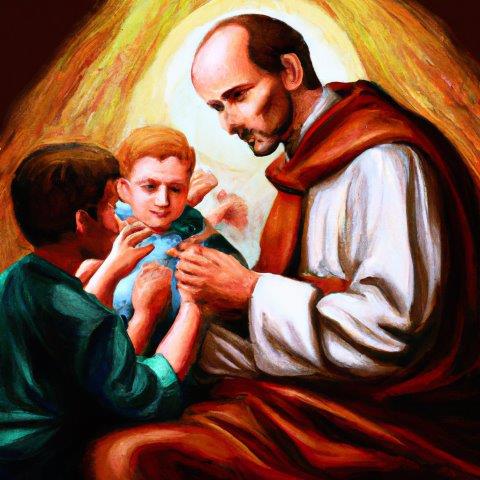 Overview
Overview
Saint Vincent de Paul, who was ordained at the age of twenty-four, was intelligent and attractive and could have risen high in a material way he had chosen to do so. In seventeenth-century France it was possible for an ambitious priest to gain position in the world. The Council of Trent had moved to bring the clergy under more rigid discipline, but in France there was considerable lag before the decrees of the Council went into effect.
Priests were not as closely supervised by their bishops as they are today. A young priest was free to seek his own post. Vincent de Paul could have lived a life of ease as chaplain to a wealthy family or perhaps to the royal family itself. He probably could have become a bishop, and there was a considerable income attached to most bishoprics. It is to his credit that he turned his back on a life of ease and devoted himself to the poor and the downtrodden.
Seeking bishop appointment
As a young priest, Saint Vincent de Paul had his share of ambition, and he seems to have given little thought to the poor. He had received his seminary training through the sacrifices of his mother and father who lived on a small farm in southwestern France. After his ordination, he set up a school for the sons of the nobility and gentry. With the money received from the tuition he continued his own higher education. By the time he was thirty he had come a long way on the path of learning and was trying to become a bishop.
In those days, the pope usually heeded the recommendations of the king when he appointed bishops, and the king, in turn, usually listened to the advice of his nobles. Through a friend who was a noble, St. Vincent thought he had a good chance of securing the king’s recommendation. For something reason the appointment did not come through. Vincent was no doubt disappointed, but he probably consoled himself with the thought 1 that he was still young and there would be other opportunities
Thus, at thirty, we find that Vincent was a good man, but ambitious and inclined to be worldly. There was nothing about him to suggest that he would become a great saint.
Captured by Pirates
A turning point came in his life when he was left a legacy. His right to his family’s inheritance was challenged, so Vincent went to court and won his case. The money was in Marseilles, and he went there to receive it. Instead of returning to southwestern France by land, he decided to go by sea.
Along his journey home, Saint Vincent’s ship was captured by Barbary pirates. The captain of the captured ship was cruelly murdered because he had resisted the pirates. Vincent and the others were put in irons and taken to the Barbary coast where they were sold as slaves. Vincent was sold first to a fisherman, then to a physician, and then to a renegade Christian farmer who had three wives. During his two years of captivity Vincent never ceased to ask our Blessed Lady for deliverance. His master was impressed by Vincent’s faith and decided to return to Europe and to the practice of his religion. Vincent and his former master secured a ship and escaped across the Mediterranean Sea to France.
Turning from slavery to God
The two years as a slave had brought about a big change in Saint Vincent de Paul. His hardships had made him more compassionate toward the sufferings of others.
Shortly after this, another event had a profound effect upon Saint Vincent. A learned theologian whom he knew was so afflicted by temptations against faith that he could not offer Mass or recite the Divine Office or even come near a church without being tempted to blasphemy, or to a denial of the very existence of God. Besides this, he suffered terrible temptations of the flesh. This sorely tried priest came to Vincent for help.
Vincent made every effort to help the priest, but all in vain. At length, Vincent asked God to relieve his friend and to let him suffer the temptations instead. Soon the priest came to Vincent with the joyful announcement bat the temptations had left him. But Vincent had the temptations a He suffered terribly for four years and wasted away in the fight.
Then Vincent prayed: “Dear God, if you will take away these temptations I will spend the rest of my life working for the poor.” The temptations stopped at once, and Vincent’s lifework had begun. It had taken two years of physical slavery and four years of spiritual agony to prepare the soul of Vincent for the work that God wanted him to do.
Leading with spirit
During the years of spiritual struggle, St. Vincent made the acquaintance of a priest, Pierre de Berulle, who became his spiritual director. Vincent said of Pierre that “he was endowed with such learning and holiness that his like could not be found.” It was upon the advice of de Berulle that Vincent accepted his next three offices. For a year, Vincent was parish priest in Clichy, a suburb of Paris. Then for four years he labored on the estate of the noble de Gondi family. This did not mean a life of ease for Vincent. The de Gondi estate was extensive. Many people lived on it. Vincent was the spiritual head of something resembling a modern country.
Congregation of the Mission / Vincentians
Soon after St. Vincent accepted this new post, he was called to attend a peasant who lay dying. He was shocked to find that the man had been poorly instructed in his religion and had been making bad confessions for years. The man said his soul would have been lost if it had not been for Vincent. As Vincent moved about the estate, he was appalled by the ignorance he found. He secured permission from Madame de Gondi to have missions given for the benefit of her dependents and to provide them with regular religious instruction. But who would give the missions and the religious instruction? Where were the priests who would devote themselves entirely to the service of the poor?
To meet the need for such priests, Vincent organized, with the approval of the Archbishop of Paris, the Congregation of the Mission. The work of this congregation was twofold: working among the poor and training future priests in seminaries. Today, the members of this order are commonly called the Vincentians. The de Gondis gave Vincent the financial help he needed to start his congregation.
Confraternities of Charity
After four years, Saint Vincent de Paul left the de Gondis and became a parish priest at Chatillon-des-Dombes. At Mass one Sunday, Vincent told his congregation about a family whose members were sick and much in need. That afternoon he called on the family. He found that the parishioners had responded generously. The family had more food than they could use before it would spoil. Vincent saw that some kind of system was needed. He found, too, that other families in the neighborhood needed assistance. To answer these needs, together with St. Elizabeth Ann Seton, organized the Confraternity of the Ladies of Charity and a little later a corresponding Confraternity of Charity for men. St. Elizabeth
The first Ladies of Charity were middle class women for whom Vincent drew up a plan of action. Each group of ladies had three officers: a president, a vice-president, and a treasurer. These officers were to visit poor families, see what they needed, and supply what was lacking. The officers were the responsible agents, but they were to enlist whatever other help was needed.
The men’s Confraternity helped find jobs for the poor, gave advice, and provided religious instruction for those who needed it. (Two hundred years later when Frederic Ozanam organized the St. Vincent de Paul Society, he used this Confraternity as a model.) Almost since the beginning of mankind, there have been people in need of charitable contributions. Always this charity had been given on a hit-or-miss basis.
St. Vincent de Paul was one of the very first to organize it. Wherever the work of the two Confraternities spread, the practice of street begging became unnecessary and was forbidden by civil authorities. When this work was well launched, Saint Vincent went back to the de Gondis. The Duke de Gondi was in charge of the galleys, or warships. These ships were propelled by galley slaves who rowed in unison.
St. Vincent became interested in the plight of these miserable men. He persuaded the Duke to provide hospitals and medical care for them and to improve the conditions in the prisons from which hey came. Vincent himself often visited the galleys, consoling the men and hearing their confessions In 1625 the first home of the Congregation of the Mission was opened and Vincent left the de Gondia to live there.
In 1632, the Congregation obtained a permanent home at St. Lazare in Paris. Here Vincent made his headquarters for the remainder of his life. The Ladies of Charity in Paris were mostly wealthy women and members of the nobility. Their social obligations often prevented them from visiting the poor families in person, so they sent their servants instead. This was not very satisfactory, also the work among the poor had grown to such proportions that the Ladies could no longer take care of it all.
Saint Vincent was convinced that there should be an organization of women who could give all their time to this work. With the help of Louise de Marillac (St. Louise), a wealthy and distinguished widow, he started the Daughters of Charity in 1633. The young women who were admitted to this organization were to work among the poor and to strive for great personal holiness. There was no idea of a religious institute at first. This idea developed gradually. The blue habit and white cornet that were eventually adopted by the Daughters of Charity of St. Vincent de Paul are now known throughout the world,
The Thirty Years’ War
In 1633, during the Thirty Years’ War, eastern France was invaded and pillaged by mercenary troops. The results were poverty, hunger, and disease. Vincent organized what would now be called “war relief” and did much to alleviate suffering. Some of his missionary priests and some of his Daughters lost their lives while fighting pestilence.
In 1634, Vincent organized the Confraternity of the Hotel Dieu to care for the sick in hospitals. One night as Vincent was walking along a street in Paris, he saw a man crippling a helpless child. He was doing this so that the child would be more pitiable and so would receive more money from his begging.
Establishing an Orphanage
Vincent’s heart could not stand such terrible injustice, and so he started a home for orphans, with the Daughters of Charity in charge. He also started a home for the aged. In this home the husband and wife were not compelled to separate in order to receive care, as was the case in most homes at that time. There is scarcely a work of charity that is known today that u not undertaken by St. Vincent more than three centuries ago.
He cared for the poor and the sick, for abandoned infants, for orphans, for prisoners. He arranged vocational training for boys and girls. In the care of the aged he was far ahead of his time, as he was in war relief. He organized his charities so that the people who needed assistance would continue to get it.
Vincent’s work was inspired by Christian ideals. Always the souls of the afflicted were cared for along with their bodies. Those who did the work were taught to recognize the poor, the sick, and the helpless as the suffering members of Jesus Christ.
Where did Vincent get the money for his many charities?
The men and women who belonged to the Confraternities of Charity collected funds. The king, queen, and nobles contributed. Civic organizations lent aid. Ordinary people in all walks of life sent in their contributions. Vincent made use of the newspapers and magazine zines to make his needs known, and the readers responded generously.
Death
Toward the end of his life, St. Vincent de Paul suffered much from ill health. In the autumn of 1661 he died calmly in his chair. He was 84 years old. He was beatified in 1729 and canonized in 1737. In 1885m, Pope Leo XIII proclaimed him patron of all charitable societies.
OTHER SAINTS OF THE SAME NAME:
St. Vincent Kadlubek, died 1223. Bishop of Cracow. Feast Day: March 8.
St. Vincent Ferrer, 1350-1419 Dominican miracle worker. Feast Day: April 5.
St. Vincent Marie Strambi, 1745-1824 Passionist, Bishop of Tolentino, Feast Day: January 1.
Popular St. Vincent de Paul Medal and St. Vincent de Paul Rosary
Prayers to St. Vincent de Paul
O Glorious Saint Vincent de Paul,
The mention of your name,
Suggests a litany of your virtues:
Humility, zeal, mercy, self-sacrifice.
It also recalls
Your many foundations:
Works of Mercy,
Congregations,
Societies.The Church gratefully remembers,
Your promotion of the priesthood.
Inspire all Charitable Workers,
Especially those who minister,
To both the spiritually
And the materially poor.O Lord, give us the grace,
That You bestowed upon,
Your servant St. Vincent de Paul,
To relinquish the temptation,
Of material things,
In our holy effort,
To minister to the poor.Amen.
Noble Saint Vincent de Paul,
beloved servant of the poor,
may we follow your example and do good works
among those whom society has abandoned,
enslaved, or forgotten.Inspire us to feed the hungry,
to love a child,
to provide comfort and medicine to the sick,
to clothe those whose garments are threadbare,
and to offer hope and our Lord’s words
to all who need respite.Pray for us to our beloved God that we may commit ourselves selflessly
to doing the same charitable acts that you did all your life,
and intercede with him that we may have the favor of his guidance
and strength and love upon this important and meaningful work. Amen.
Prayer to St. Vincent de Paul
O great St. Vincent de Paul, full of compassion for those in need, you devoted your life to serving the poor and sick. Help us to imitate your charity and love for all, especially those who are most in need. Obtain for us the grace to comfort and assist those who are suffering, and may we attain everlasting life through following your example. Amen.
St. Vincent de Paul, Patron of Charitable Works
Dear St. Vincent, you showed us the true meaning of charity through your selfless actions. Help us to embody this spirit by reaching out to those in need and making a difference in their lives. Inspire us to be generous with our time, talents, and resources, and to always put the needs of others before our own. Through your intercession, may we make a positive impact in our communities and bring hope to those who are struggling. Amen.
St. Vincent de Paul, Intercessor for the Homeless
St. Vincent, you dedicated your life to serving the homeless and those in need. We pray for your intercession on behalf of all those who are without a place to call home. May they feel your comfort and love, and may they find a safe and secure place to live. Help us to always be mindful of their needs and to offer a helping hand in their time of need. Amen.
St. Vincent de Paul, Protector of the Poor
St. Vincent, you spent your life serving the poor and were a true friend to those in need. We ask for your guidance and protection for all those who suffer poverty and hardship. May they find comfort in your love, and may their spirits be lifted as they see your example of generosity and kindness. Help us to always be mindful of their needs and to offer a helping hand in their time of need. Amen.
St. Vincent de Paul: The Patron Saint of Charitable Works
St. Vincent de Paul is the patron saint of charitable works and is venerated for his dedication to helping the poor and the marginalized. Born in 1580 in France, he was a priest and a philanthropist who founded several organizations dedicated to serving the needy, including the Daughters of Charity and the Congregation of the Mission.
St. Vincent de Paul’s life was marked by his tireless work to alleviate the suffering of the poor and the oppressed. He traveled throughout France, helping the poor, the sick, and the imprisoned, and he established hospitals and schools to provide care and education to those in need. His unwavering commitment to helping others inspired others to join him in his mission, and his organizations continue to help people in need today.
Because of his dedication to serving the poor and his tireless work to help others, St. Vincent de Paul has become the patron saint of charitable works. He is a symbol of compassion and selflessness, and his example continues to inspire people to help those in need. Whether through volunteering, donating money, or simply offering a kind word, St. Vincent de Paul’s legacy continues to inspire people to make a difference in the world.” “
Reflection on the feast day of St. Vincent de Paul
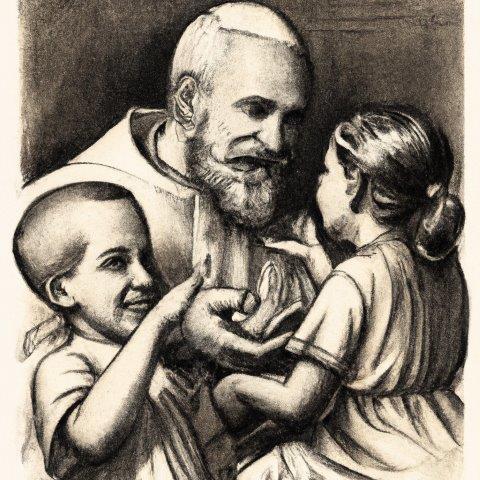 The feast day of St. Vincent de Paul is celebrated on September 27th.
The feast day of St. Vincent de Paul is celebrated on September 27th.
St. Vincent de Paul was a French priest and philanthropist who is known for his work with the poor and his dedication to serving those in need. He is the founder of the Congregation of the Mission and the Daughters of Charity, religious communities which continue to serve the poor and marginalized around the world.
As we celebrate the feast day of St. Vincent de Paul, we are reminded of the importance of serving others, particularly those who are less fortunate. St. Vincent de Paul teaches us that true Christianity is not just about personal piety, but also about reaching out to others with compassion and love. He reminds us that serving the poor and marginalized is not just an option for Christians, but a fundamental aspect of our faith.
St. Vincent de Paul’s example also teaches us about the power of community in serving others. He recognized that one person alone could not meet the needs of the poor and marginalized, and so he founded communities of people dedicated to this work. This reminds us that service to others is not something that we can do alone, but it is something that requires the support and cooperation of others.
St. Vincent de Paul’s life and work also remind us of the importance of humility and simplicity. He lived a simple life and focused on serving others, rather than accumulating wealth or power. He teaches us that true greatness is found not in the accumulation of material things, but in the love and service we give to others.
In conclusion, let us reflect on the example of St. Vincent de Paul, and strive to serve others, particularly those who are less fortunate. Let us remember that serving the poor and marginalized is not just an option for Christians, but a fundamental aspect of our faith. Let us be reminded of the importance of community in serving others, humility, and simplicity in our lives. May his spirit inspire us to reach out to others with compassion and love, as we work to build a more just and equitable world.
Discover biographies, prayers, and reflections for more than 400 Catholic Saints
Saints Similar to St. Vincent de Paul
You may also be interested in reading the Biography of St. Vincent Ferrer. St. Vincent de Paul and St. Vincent Ferrer were both prominent Catholic priests and missionaries, known for their charitable work. Next up: Biography of St. Vincent Ferrer
Also check out our handmade St. Vincent de Paul Medal and St. Vincent de Paul Rosary and St. Vincent de Paul Rosary Bracelet .

